[ Home ] [ Controlled Substances ] [ Depressants ]
PREGABALIN
|
Lyrica works by binding to the alpha2-delta site in the central nervous system, calming overactive nerves. Impulses in the brain are slowed down and the drug stops seizures right as they are beginning. According to the Epilepsy Foundation, Lyrica is a good add-on to other seizure medications and those who took Lyrica with another prescribed seizure medication experienced a great reduction in their seizures. While Lyrica can be beneficial to those who need it, others are at risk for developing a Lyrica addiction.
Lyrica has side effects which may be made worse by health problems, such as having a mood disorder, heart problems, kidney disease, lung disease, or a previous or current drug or alcohol addiction. Lyrica can cause a severe allergic reaction in some that appears in the form of hives or blisters on this skin, swelling in the throat, tongue, lips, or face, and difficulty breathing.

https://www.addictioncenter.com/drugs/lyrica-addiction-abuse/
About Pregabalin:
- Pregabalin is used to treat epilepsy and anxiety.
- It is also taken to treat nerve pain. Nerve pain can be caused by different illnesses including diabetes and shingles, or an injury.
- Pregabalin works in different ways:
- in epilepsy it stops seizures by reducing the abnormal electrical activity in the brain
- with nerve pain it blocks pain by interfering with pain messages travelling through the brain and down the spine
- in anxiety it stops your brain from releasing the chemicals that make you feel anxious
- Pregabalin is only available on prescription. It comes as capsules or a liquid that you drink.
Key Facts:
- Pregabalin is usually taken 2 or 3 times a day. You can take it with or without food.
- You don't have to have epilepsy for pregabalin to help with pain or anxiety.
- It takes at least a few weeks for pregabalin to work.
- The side effects of pregabalin are usually mild and go away by themselves. The most common ones are feeling sleepy, dizziness and headaches.
- Pregabalin is also called by the brand names Lyrica, Alzain, Lecaent and Rewisca.
- Pregabalin is only for adults. Do not give it to children under the age of 18.
How much will I take?
- The usual dose of pregabalin is between 150mg and 600mg a day split into 2 or 3 separate doses.
- If you are taking pregabalin as a liquid, 2.5ml is usually the same as taking a single 50mg capsule. Always check the label.
- Swallow pregabalin capsules whole with a drink of water or juice. Do not chew them.
If you have epilepsy, it is likely that once your illness is under control you will continue to take pregabalin for many years.
If you are taking pregabalin for nerve pain or anxiety it is likely that once your symptoms have gone you will continue to take it for several months to stop them coming back.
Why is it prescribed?
Pregabalin capsules, oral solution (liquid), and extended-release (long-acting) tablets are used to relieve neuropathic pain (pain from damaged nerves) that can occur in your arms, hands, fingers, legs, feet, or toes if you have diabetes and postherpetic neuralgia (PHN; the burning, stabbing pain or aches that may last for months or years after an attack of shingles). Pregabalin capsules and oral solution are also used to relieve neuropathic pain that can occur after a spinal cord injury and to treat fibromyalgia (a long-lasting condition that may cause pain, muscle stiffness and tenderness, tiredness, and difficulty falling asleep or staying asleep). Pregabalin capsules and oral solution are used along with other medications to treat certain types of seizures in adults and children 1 month of age and older. Pregabalin is in a class of medications called anticonvulsants. It works by decreasing the number of pain signals that are sent out by damaged nerves in the body.
GABA Neurotransmitter:
Lyrica is similar in structure to one of the major chemical neurotransmitters in the human brain, GABA (gamma aminobutyric acid). GABA is the most important inhibitory neurotransmitter - that is, it prevents nerve cells in the brain from firing too quickly, as they do in seizures. As it turns out, however, Lyrica does not act like GABA in the brain.
| Lyrica Tablets: | ||
|---|---|---|
 | 25-mg | (white, hard-gelatin) Capsules with "Pfizer" on the cap, "PGN 25" on the body |
 | 50-mg | (white and with navy stripe, hard-gelatin) Capsules with "Pfizer" on the cap, "PGN 50" on the body |
 | 75-mg | (orange/white, hard-gelatin) Capsules with "Pfizer" on the cap, "PGN 75" on the body |
 | 100-mg | (orange, hard-gelatin) Capsules with "Pfizer" on the cap, "PGN 100" on the body |
 | 150-mg | (white, hard-gelatin) Capsules with "Pfizer" on the cap, "PGN 150" on the body |
 | 200-mg | (light orange, hard-gelatin) Capsules with "Pfizer" on the cap, "PGN 200" on the body |
 | 225-mg | (white/light orange,hard-gelatin) Capsules with "Pfizer" on the cap, "PGN 225" on the body |
 | 300-mg | (white/orange, hard-gelatin) Capsules with "Pfizer" on the cap, "PGN 300" on the body |
Used to treat:
- Focal Impaired Awareness or Complex Partial Seizures
- Focal Aware or Simple Partial Seizure

https://www.epilepsy.com/medications/pregabalin
Pregabalin belongs to a group of medicines known as anti-epileptic medicines, although it is prescribed for the treatment of several different conditions. You may have been prescribed it for the treatment of partial seizures, which are a type of epilepsy. A seizure is a short episode of symptoms which is caused by a burst of abnormal electrical activity in the brain. With a partial seizure, the burst of electrical activity stays in one part of the brain. Therefore, you tend to have localised or 'focal' symptoms. Pregabalin works by reducing the abnormal electrical activity in the brain. It is taken alongside other medicines for epilepsy.
Pregabalin is also prescribed to treat certain types of long-lasting pain caused by damage to nerves. This type of pain, called neuropathic pain, can be caused by a number of different conditions, including diabetes (where it is called diabetic neuropathy) and shingles (where it is called postherpetic neuralgia).
Pregabalin can also be helpful in treating the symptoms of generalised anxiety disorder (GAD), particularly if other medicines which are more often prescribed for people with this condition are not suitable. GAD is a long-term condition where anxiety is a major symptom.

https://patient.info/medicine/pregabalin-alzain-axalid-lecaent-lyrica
Definition:
Pregabalin: A drug used to treat nerve pain caused by diabetes or herpes zoster infection and certain types of seizures. It is being studied in the prevention and treatment of nerve pain in the hands and feet of cancer patients given chemotherapy. Pregabalin is a type of anticonvulsant. Also called Lyrica.

https://www.cancer.gov/publications/dictionaries/cancer-terms/def/pregabalin
(2006 Study) Tolerability:
Approximately one in 11 patients (9 percent) will discontinue use of pregabalin because of side effects. Dizziness and somnolence are the most common side effects causing discontinuation. If dizziness or somnolence occur, the symptoms will begin shortly after initiation of treatment and in patients receiving higher doses. Dizziness occurs in almost one in three patients (29 percent), and somnolence occurs in about one in five patients (22 percent); however, only one in 25 patients (4 percent) will discontinue treatment because of these. In patients receiving pregabalin, dry mouth, edema, weight gain, blurred vision, and difficulty concentrating occur at twice the rate seen in those receiving placebo.
(2006 Study) Bottom Line:
Pregabalin is safe and effective for the management of neuropathic pain associated with diabetic peripheral neuropathy. Drawbacks include the cost and the lack of studies demonstrating equivalence or superiority to other treatments. However, pregabalin's ease of dosing titration, minimal drug interactions, and favorable side effect profile make it appealing for those who cannot tolerate less-expensive alternatives. Until research establishes a relative benefit of pregabalin, it is better suited as a second-line therapy or as an alternative treatment option if less-expensive medications fail.

https://www.aafp.org/afp/2006/1215/p2093.html
Administration:
Pregabalin is administered orally and is available in capsules or oral solution. Following oral administration, pregabalin reaches peak plasma concentrations within 1.5 hours and achieves steady state within 24 to 48 hours. The absorption of pregabalin is independent of the dose. Pregabalin readily crosses the blood-brain barrier. Humans cannot significantly metabolize pregabalin. Its elimination is primarily as an unchanged drug (less than 2% metabolized) by renal excretion. In patients with normal renal function, the mean elimination half-life is 6.3 hours. Researchers have studied pregabalin at dosages up to 600 mg/day. However, they did not find 600 mg/day to provide significant additional benefit and was less well tolerated due to side effects.When discontinuing pregabalin, the recommendation is to taper the drug gradually over one week. In patients with seizure disorders, withdraw pregabalin gradually to minimize the risk of increased seizure.
 Pregabalin:
Pregabalin:
https://www.ncbi.nlm.nih.gov/books/NBK470341/
Pregabalin, marketed under the brand name Lyrica among others. LYRICA is indicated for: Neuropathic pain associated with diabetic peripheral neuropathy (DPN) Postherpetic neuralgia (PHN); Adjunctive therapy for adult patients with partial onset seizures; Fibromyalgia; Neuropathic pain associated with spinal cord injury. While pregabalin is a structural derivative of the inhibitory neurotransmitter gamma aminobutyric acid (GABA), it does not bind directly to GABAA, GABAB, or benzodiazepine receptors, does not augment GABAA responses in cultured neurons, does not alter rat brain GABA concentration or have acute effects on GABA uptake or degradation. However, in cultured neurons prolonged application of pregabalin increases the density of GABA transporter protein and increases the rate of functional GABA transport. Pregabalin does not block sodium channels, is not active at opiate receptors, and does not alter cyclooxygenase enzyme activity. It is inactive at serotonin and dopamine receptors and does not inhibit dopamine, serotonin, or noradrenaline reuptake.
 Pregabalin:
Pregabalin:
https://drugs.ncats.io/drug/55JG375S6M
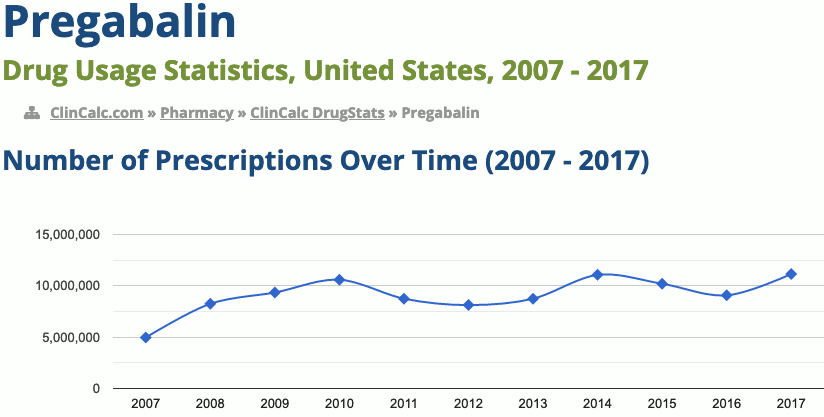
72nd most prescribed medicine in the United States for 2017

https://clincalc.com/DrugStats/Drugs/Pregabalin
What is the most important information I should know about pregabalin?
- Pregabalin can cause a severe allergic reaction. Stop taking this medicine and seek emergency medical help if you have hives or blisters on your skin, trouble breathing, or swelling in your face, mouth, or throat.
- Some people have thoughts about suicide while taking pregabalin. Stay alert to changes in your mood or symptoms. Report any new or worsening symptoms to your doctor.
- If you have diabetes or heart problems, call your doctor if you have weight gain or swelling in your hands or feet while taking pregabalin.
- Do not stop using pregabalin suddenly, even if you feel fine. Stopping suddenly may cause withdrawal symptoms.
Liver:
Therapy with pregabalin is not associated with serum aminotransferase elevations, and clinically apparent liver injury from pregabalin has been reported but appears to be quite rare.
Pregabalin Hepatotoxicity:
Limited data is available on the hepatotoxicity of pregabalin. In prelicensure clinical trials in diabetic neuropathy and epilepsy, therapy with pregabalin was not associated with an increased frequency of serum aminotransferase elevations or liver toxicity. Since its approval and more wide scale use, however, pregabalin has been linked to rare instances of clinically apparent liver injury. Most cases were mild and frequently without jaundice. The latency to onset of injury was short, symptoms of liver injury arising within 3 to 14 days. Both cholestatic and hepatocellular patterns of injury have been reported. Signs of hypersensitivity (fever, rash, eosinophilia) and autoimmunity were not present. Some cases have been severe and associated with marked jaundice and prolongation of the prothrombin time, but all cases ultimately resolved after the medication was stopped without evidence of residual injury.C Likelihood score: C (probable rare cause of clinically apparent liver injury).
 Pregabalin Overview:
Pregabalin Overview:
https://www.ncbi.nlm.nih.gov/books/NBK548053/
What should I tell my health care provider before I take it?
They need to know if you have any of these conditions:
- Heart disease
- History of drug abuse or alcohol abuse problem
- Kidney disease
- Lung or breathing disease
- Suicidal thoughts, plans, or attempt; a previous suicide attempt by you or a family member
- An unusual or allergic reaction to pregabalin, gabapentin, other medicines, foods, dyes, or preservatives
- Pregnant or trying to get pregnant
- Breast-feeding

https://my.clevelandclinic.org/health/drugs/19097-pregabalin-capsules
Important Information
Pregabalin can cause a severe allergic reaction. Stop taking pregabalin and seek emergency medical help if you have hives or blisters on your skin, trouble breathing, or swelling in your face, mouth, or throat.
Some people have thoughts about suicide while taking pregabalin. Stay alert to changes in your mood or symptoms. Report any new or worsening symptoms to your doctor.If you have diabetes or heart problems, call your doctor if you have weight gain or swelling in your hands or feet while taking pregabalin.
Do not stop using pregabalin suddenly, even if you feel fine. Stopping suddenly may cause withdrawal symptoms.
Avoid drinking alcohol. It may increase certain side effects of pregabalin.
Avoid driving or hazardous activity until you know how pregabalin will affect you. Your reactions could be impaired.
Interactions:
Drug Interactions (265) Alcohol/Food Interactions (1) Disease Interactions (5)
What other drugs will affect Pregabalin?
Using pregabalin with other drugs that slow your breathing can cause dangerous side effects or death. Ask your doctor before using opioid medication, a sleeping pill, cold or allergy medicine, a muscle relaxer, or medicine for anxiety or seizures. Tell your doctor about all your other medicines, especially:This list is not complete. Other drugs may affect pregabalin, including prescription and over-the-counter medicines, vitamins, and herbal products. Not all possible drug interactions are listed here.
- oral diabetes medicine - pioglitazone, rosiglitazone; or
- an ACE inhibitor - benazepril, captopril, enalapril, fosinopril, lisinopril, moexipril, perindopril, quinapril, ramipril, or trandolapril.
A total of 265 drugs are known to interact with Pregabalin.
- 24 major drug interactions
- 240 moderate drug interactions
- 1 minor drug interaction
 Pregabalin Information:
Pregabalin Information:
https://www.drugs.com/mtm/pregabalin.html
Which drugs or supplements interact with Lyrica (pregabalin)?
- Alcohol and drugs that cause sedation may increase the sedative effects of pregabalin.
- Pioglitazone (Actos) and rosiglitazone (Avandia) cause weight gain, fluid retention, and possibly heart failure. Therefore, combining pregabalin with these drugs may increase the occurrence of weight gain and fluid retention.

https://www.medicinenet.com/pregabalin_lyrica/article.htm
Fatal overdose may occur when gabapentinoids are combined with other depressants such as opiates, benzodiazepines, barbiturates, thienodiazepines, alcohol or other GABAergic substances. It is strongly discouraged to combine these substances, particularly in common to heavy doses.
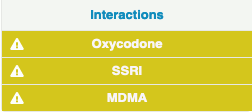

https://psychonautwiki.org/wiki/Pregabalin
Important Warnings:
This drug can cause serious allergic reactions. These include trouble breathing, shortness of breath, and rash, hives, and blisters on your skin. If you have any of these symptoms, stop taking this drug and seek medical help right away.
This drug can increase your risk of having suicidal thoughts and behavior. Talk to your doctor right away if you have any unusual changes in your mood or behavior, new or worsening depression, or thoughts of harming yourself.
This drug can cause dizziness, drowsiness, and blurry vision. It may affect your ability to think, see, or move. You shouldn't drive, use machinery, or do other tasks that require alertness until you know how this drug affects you.
Use of this drug can lead to misuse. Your risk may be greater if you have a history of drug misuse.
 Pregabalin' Oral Capsule:
Pregabalin' Oral Capsule:
https://www.healthline.com/health/pregabalin-oral-capsule#important-warnings
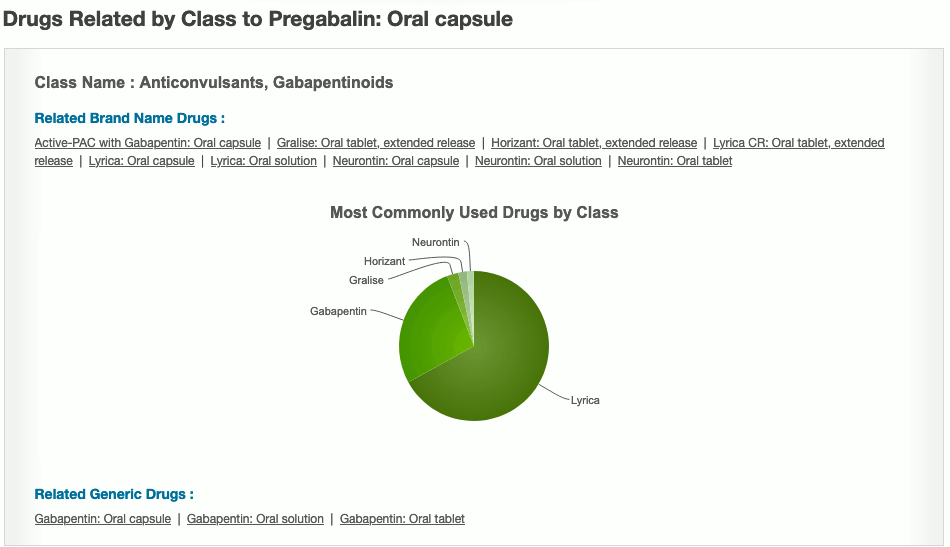
Reduces Pain and Improves Function:
Lyrica is not a cure for fibromyalgia, but it may help control your symptoms. It can take several weeks before you feel the benefits.
Exactly how Lyrica works is unknown. Fibromyalgia symptoms have been linked to changes in the brain that influence how people perceive pain.
People with fibromyalgia experience a heightened sensitivity to stimuli that are not normally painful to others. Some data suggests Lyrica binds to a protein in nerve cells that is responsible for the heightened sensitivity.
First Drug Approved for Fibromyalgia
Lyrica was approved by the FDA for the treatment of fibromyalgia in adults 18 years and older in 2007. Marketed by Pfizer, it was previously approved for the management of diabetic peripheral neuropathy, post-herpetic neuralgia, and as an additional therapy for adults with partial onset seizures.
Until the approval of Lyrica capsules, no medicine was specifically approved to treat fibromyalgia.

https://www.verywellhealth.com/lyrica-10-things-you-should-know-190248
WHO Report:Effects on Central Nervous System:
Pregabalin has been found to produce effects that are similar to those produced by controlled substances, such as benzodiazepines, that increase GABA activity.Dependence Potential:
Tolerance has been shown to develop to the effects of pregabalin, particularly the euphoric effects. A number of published reports have described physical dependence associated with pregabalin use in humans. The withdrawal symptoms that occur following abrupt discontinuation of pregabalin include:Current evidence suggests that the incidence and severity of withdrawal symptoms may be dose-related and hence those taking doses above the normal therapeutic range are most at risk of withdrawal. At therapeutic doses, withdrawal may be minimized by gradual dose tapering.
- Insomnia
- Nausea
- Headache
- Anxiety
- Sweating
- Diarrhoea
Recommendation:
The Committee noted that there has been increasing concern in many countries regarding the abuse of pregabalin. A number of cases of dependence have been reported and there are increasing reports of adverse effects. While these problems are concentrated in certain drug using populations, there is presently limited data on the extent of the problems related to pregabalin abuse in the general population. The Committee also noted that pregabalin has approved therapeutic uses for a range of medical conditions, including some for which there are few therapeutic options.

 (PDF page 18 / 22 pages) (41st Expert Committee on Drug Dependence):
(PDF page 18 / 22 pages) (41st Expert Committee on Drug Dependence):
https://www.who.int/medicines/access/controlled-substances/Annex_1_41_ECDD_recommendations_NPS_and_medicines_22012019.pdf#page=18
Dose:
In New Zealand, pregabalin is available as capsules (25 mg, 75 mg, 150 mg and 300 mg).
- The usual dose of pregabalin is 150 mg 2 times a day, but some people may need a higher dose.
- Your doctor will start you on a low dose of 75 mg two times a day and increase the dose after a few days. This allows your body to get used to the medicine and reduces the chances of side effects.
- Always take your pregabalin exactly as your doctor has told you.
- The pharmacy label on your medicine will tell you how much pregabalin to take, how often to take it and any special instructions.

https://www.healthnavigator.org.nz/medicines/p/pregabalin/
| Maximum Dosage: | |
|---|---|
| Prescribers Digital Reference | |

Lyrica - Drug Summary: https://www.pdr.net/drug-summary/Lyrica-pregabalin-467 | |
| Adults: | Immediate-release formulations: 300 mg/day PO for diabetic peripheral neuropathy; 600 mg/day PO for postherpetic neuralgia, neuropathic pain due to spinal cord injury, and adjunctive treatment of seizures; 450 mg/day PO for fibromyalgia. Extended-release tablets: 330 mg/day PO for diabetic peripheral neuropathy; 660 mg/day PO for postherpetic neuralgia. |
| Geriatric: | Immediate-release formulations: 300 mg/day PO for diabetic peripheral neuropathy; 600 mg/day PO for postherpetic neuralgia, neuropathic pain due to spinal cord injury, and adjunctive treatment of seizures; 450 mg/day PO for fibromyalgia. Extended-release tablets: 330 mg/day PO for diabetic peripheral neuropathy; 660 mg/day PO for postherpetic neuralgia. |
| Adolescents: | Immediate-release formulations: 17 years: 600 mg/day PO for adjunctive treatment of partial seizures. 13 to 16 years weighing 30 kg or more: 10 mg/kg/day PO (Max: 600 mg/day) for adjunctive treatment of partial seizures. 13 to 16 years weighing less than 30 kg: 14 mg/kg/day PO for adjunctive treatment of partial seizures. Extended-release tablets: Safety and efficacy have not been established. |
| Children: | Immediate-release formulations: Weighing 30 kg or more: 10 mg/kg/day PO (Max: 600 mg/day) for adjunctive treatment of partial seizures. Weighing less than 30 kg: 14 mg/kg/day PO for adjunctive treatment of partial seizures. Extended-release tablets: Safety and efficacy have not been established. |
| Infants: | Immediate-release formulations: 14 mg/kg/day PO for adjunctive treatment of partial seizures. Extended-release tablets: Safety and efficacy have not been established. |
| Neonates: | Safety and efficacy have not been established. |
Prescribed for:
- Nerve pain after herpes
- Diabetic complication causing injury to some body nerves
- Additional medication to treat partial seizures
- Disorder characterized by stiff, tender & painful muscles
- Nerve pain from spinal cord injury
- Acute pain following an operation
- Repeated episodes of anxiety
- Restless legs syndrome
- An extreme discomfort in the calf muscles when sitting or lying down
- Change of life signs
- Extreme apprehension or fear of social interaction
Used for:
This medication is used to treat pain caused by nerve damage due to diabetes, shingles (herpes zoster) infection, or spinal cord injury. This medication is also used to treat pain in people with fibromyalgia. It is also used with other medications to treat certain types of seizures (focal seizures).Before using:
Tell your doctor or pharmacist your medical history, especially of:
- Heart problems (such as heart failure)
- Kidney disease
- History of an allergic reaction which included itching/swelling of the face/lips/tongue/throat (angioedema)
- Personal or family history of a substance use disorder (such as overuse of or addiction to drugs/alcohol)
- Breathing problems (such as COPD)
Precautions:
- This drug may make you dizzy or drowsy or blur your vision.
- Alcohol or marijuana (cannabis) can make you more dizzy or drowsy.
- Do not drive, use machinery, or do anything that needs alertness or clear vision until you can do it safely.
- Avoid alcoholic beverages.
- Talk to your doctor if you are using marijuana (cannabis).
Read Reviews (107):
https://www.webmd.com/drugs/drugreview-93954-pregabalin-oral.aspx?drugid=93954&drugname=pregabalin-oral
User Reviews:
107 Total User Reviews Pregabalin Oral Read Reviews Condition: Neuropathic Pain (49 Reviews): Effectiveness (3.29) Ease of Use (4.00) Satisfaction (2.84)
 Pregabalin 200 Mg Capsule Anticonvulsants, Gaba-Derivative-Type (Lyrica):
Pregabalin 200 Mg Capsule Anticonvulsants, Gaba-Derivative-Type (Lyrica):
https://www.webmd.com/drugs/2/drug-93954-528/pregabalin-oral/pregabalin-oral/details
How long will it take to work?
- You should notice that your pain starts to improve over one to two weeks after starting pregabalin, but it may take longer in some people. However, some people feel benefit straight away. Your treatment will be reviewed when you next see the doctor or nurse.
How long will I have to take it?
- If pregabalin is helpful, you can continue taking it and your treatment will be reviewed regularly. There is no possibility of you becoming addicted to the tablets. It is also important that you continue to take your regular painkiller, unless you have been advised to stop taking these by your doctor.

 Pregabalin and its use in pain management (PDF 4 pages):
Pregabalin and its use in pain management (PDF 4 pages):
https://www.wsh.nhs.uk/CMS-Documents/Patient-leaflets/PainService/5311-1Pregabalinanditsuseinpainmanagement.pdf
| Duration: | |||
| Route | Onset | Duration | After Effects |
|---|---|---|---|
| Tripsit Factsheets | |||

Pregabalin Basic Information: http://drugs.tripsit.me/pregabalin | |||
| All ROAs | 90-150 minutes | 6-14 hours | 1-12 hours |
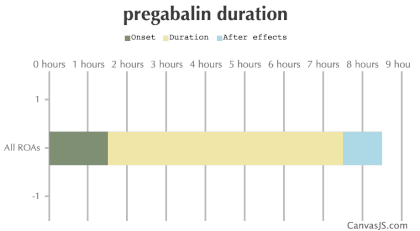
| |||
| Summary: (Lyrica) is a GABA derivative that is used to treat neuropathic pain and seizures, as well as anxiety. It is sometimes used recreationally, however an unusual tolerance profile renders it ineffective with regular use. | |||
| Effects: Anxiolytic, Sedative, Muscle Relaxant, Amnesia, Dystaxia, Hypnotic. | |||
| Side Effects: |
| Pregabalin can cause a severe allergic reaction. Stop taking this medicine and get emergency medical help if you have: hives or blisters on your skin; difficult breathing; swelling of your face, lips, tongue, or throat. |
|---|
| RxList |

Lyrica (pregabalin): https://www.rxlist.com/lyrica-drug/patient-images-side-effects.htm |
| Report any new or worsening symptoms to your doctor, such as: mood or behavior changes, depression, anxiety, panic attacks, trouble sleeping, or if you feel impulsive, irritable, agitated, hostile, aggressive, restless, hyperactive (mentally or physically), or have thoughts about suicide or hurting yourself. |
Call your doctor at once if you have:
|
| If you have diabetes, tell your doctor right away if you have any new sores or other skin problems. |
Common side effects may include:
|
| This is not a complete list of side effects and others may occur. Call your doctor for medical advice about side effects. You may report side effects to FDA at 1-800-FDA-1088. |
Pediatric:
Appropriate studies have not been performed on the relationship of age to the effects of pregabalin in children younger than 1 month of age for partial onset seizures.Safety and efficacy have not been established for other conditions.
Geriatric:
Appropriate studies performed to date have not demonstrated geriatric-specific problems that would limit the usefulness of pregabalin in the elderly. However, elderly patients are more likely to have unwanted effects (eg, dizziness, blurred vision, confusion, or clumsiness) and age-related kidney problems, which may require an adjustment in the dose for patients receiving pregabalin.Other Medical Problems:
The presence of other medical problems may affect the use of this medicine. Make sure you tell your doctor if you have any other medical problems, especially:
- Alcohol or drug abuse, history of
- Angioedema (severe swelling), history of
- Congestive heart failure
- Diabetes - May cause side effects to become worse
- Behavior changes, history of
- Bleeding disorder
- Depression, history of
- Edema (body swelling or fluid retention)
- Heart rhythm problem (eg, prolonged PR interval)
- Lung or breathing problems (eg, respiratory depression)
- Thrombocytopenia (low platelets in the blood) - Use with caution. May make these conditions worse
- Kidney disease - Use with caution. The effects may be increased because of slower removal of the medicine from the body
 Pregabalin (Oral Route) (Lyrica):
Pregabalin (Oral Route) (Lyrica):
https://www.mayoclinic.org/drugs-supplements/pregabalin-oral-route/description/drg-20067411
Breastfeeding:Summary of Use During Lactation:
Limited data indicate that amounts of pregabalin in breastmilk are low.If pregabalin is required by the mother of an older infant, it is not a reason to discontinue breastfeeding, but until more data become available, an alternate drug may be preferred, especially while nursing a newborn or preterm infant.
Drug Levels:
In published reports of anticonvulsant use during breastfeeding, most women were taking a combination of anticonvulsants. Some other anticonvulsants (e.g., phenytoin, carbamazepine) stimulate the metabolism of other drugs including anticonvulsants, whereas others (e.g., valproic acid) inhibit the metabolism of other drugs. Therefore, the relationship of the maternal dosage to the concentration in breastmilk can be quite variable, making calculation of the weight-adjusted percentage of maternal dosage less meaningful than for other drugs in this databaseAlternate Drugs to Consider:
- (Neuropathic Pain) Carbamazepine
- Gabapentin
- (Seizure Disorder) Carbamazepine
- Divalproex
- Gabapentin
- Lamotrigine
- Oxcarbazepine
- Phenytoin
- Valproic Acid
 Pregabalin Drug Levels and Effects:
Pregabalin Drug Levels and Effects:
https://www.ncbi.nlm.nih.gov/books/NBK501821/
2018 Study: Authors' conclusions:
Evidence shows efficacy of pregabalin in postherpetic neuralgia, painful diabetic neuralgia, and mixed or unclassified post-traumatic neuropathic pain, and absence of efficacy in HIV neuropathy; evidence of efficacy in central neuropathic pain is inadequate. Some people will derive substantial benefit with pregabalin; more will have moderate benefit, but many will have no benefit or will discontinue treatment. There were no substantial changes since the 2009 review.

https://www.cochrane.org/CD007076/SYMPT_pregabalin-chronic-neuropathic-pain-adults
FDA warns about serious breathing problems with seizure and nerve pain medicines gabapentin (Neurontin, Gralise, Horizant) and pregabalin (Lyrica, Lyrica CR) When used with CNS depressants or in patients with lung problems.

https://www.fda.gov/drugs/drug-safety-and-availability/fda-warns-about-serious-breathing-problems-seizure-and-nerve-pain-medicines-gabapentin-neurontin
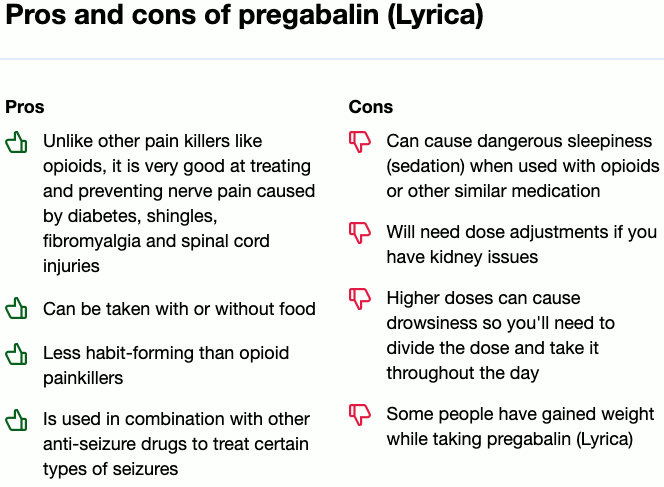

https://www.goodrx.com/lyrica/what-is
Abuse:
In a study of recreational users (N=15) of sedative/hypnotic drugs, including alcohol, pregabalin (450 mg, single dose) received subjective ratings of "good drug effect," "high" and "liking" to a degree that was similar to diazepam (30 mg, single dose). In controlled clinical studies in over 5,500 patients, 4% of pregabalin-treated patients and 1% of placebo-treated patients overall reported euphoria as an adverse reaction, though in some patient populations studied, this reporting rate was higher and ranged from 1 to 12%.

https://www.healthgrades.com/drugs/pregabalin
2017 Article:
Pregabalin - a substance used to treat nerve pain, epilepsy and anxiety - is increasingly being handed out too readily and being used recreationally, according to doctors and pharmacists. They say that when it is mixed with other substances it can lead to overdose. Deaths connected to pregabalin have risen from four in 2012 to 111 last year, according to the Office for National Statistics.
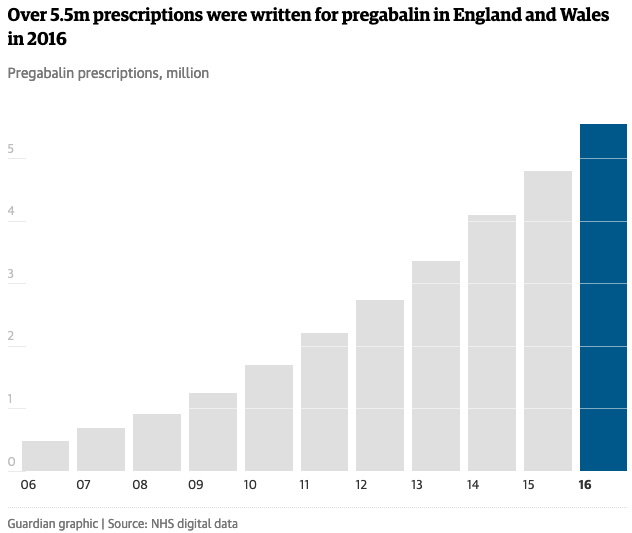
Data provided by NHS Digital shows that prescriptions for pregabalin have shot up more than 11-fold in the last decade, from 476,102 in 2006 to 5,547,560 last year. The government has now accepted in principle that pregabalin should be reclassified as a class C controlled substance, which would mean patients could not obtain a repeat prescription.

https://www.theguardian.com/society/2017/sep/21/pregabalin-new-valium-class-c-drug-deaths
User Ratings:
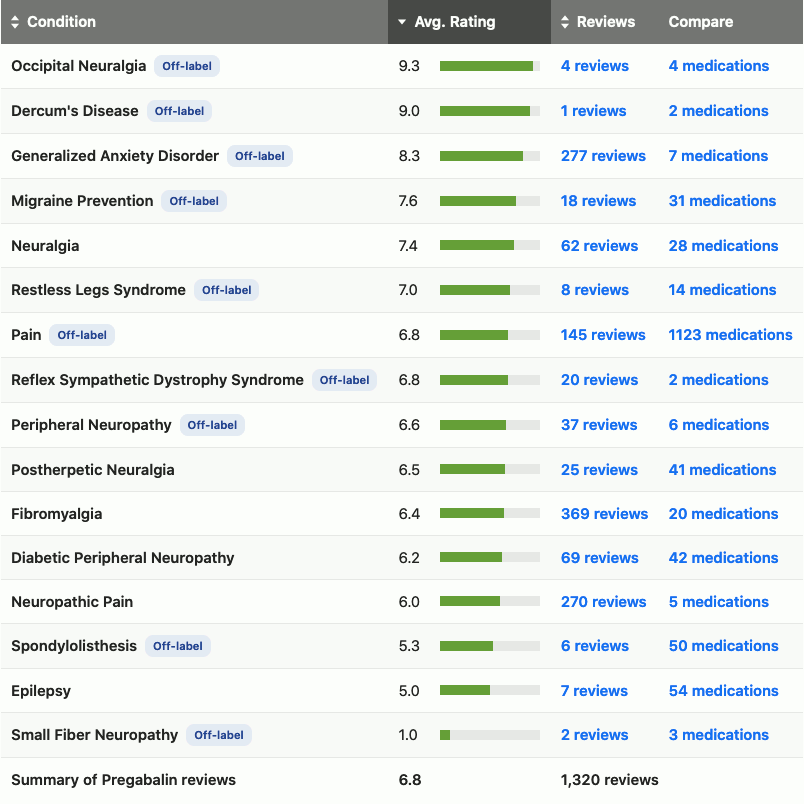

https://www.drugs.com/comments/pregabalin/

https://www.everydayhealth.com/drugs/lyrica/reviews

http://www.druglib.com/ratingsreviews/lyrica/

https://www.patientslikeme.com/treatment/pregabalin?condition_id=8

https://erowid.org/experiences/subs/exp_Pharms_Pregabalin.shtml

https://www.reddit.com/r/pregabalin/

https://drugs-forum.com/tags/pregabalin/

https://dailymed.nlm.nih.gov/dailymed/archives/fdaDrugInfo.cfm?archiveid=41099

https://reference.medscape.com/drug/lyrica-cr-pregabalin-343368


https://www.accessdata.fda.gov/drugsatfda_docs/label/2011/021446s026,022488s005lbl.pdf


https://www.accessdata.fda.gov/drugsatfda_docs/label/2018/021446s035,022488s013lbl.pdf

https://www.medicines.org.uk/EMC/medicine/14651/SPC/Lyrica+Capsules/

http://labeling.pfizer.com/ShowLabeling.aspx?id=9678

https://www.lyrica.com/
- An anticonvulsant and anxiolytic medication.
- Approved for medical use in the United States in 2004.
- Used to treat epilepsy, neuropathic pain, fibromyalgia, restless leg syndrome, and generalized anxiety disorder.
- It is taken by mouth.
When used before surgery, it reduces pain but results in greater sedation and visual disturbances.
- Common side effects include:
- Headache
- Dizziness
- Sleepiness
- Confusion
- Trouble with memory
- Poor coordination
- Dry mouth
- Problem with vision
- Weight gain
- Serious side effects may include:
- Angioedema
- Drug misuse
- An increased suicide risk
When pregabalin is taken at high doses over a long period of time, addiction may occur, but if taken at usual doses the risk is low.
- In 2017, it was the 72nd most commonly prescribed medication in the United States, with more than eleven million prescriptions.
- It is available as a generic medication in a number of countries, including the United States as of 2019.
- In the US, Pregabalin is a Schedule V controlled substance under the Controlled Substances Act of 1970.
- It is a Class C controlled substance in the UK.
Anxiety drug pregabalin linked to rising number of deaths – here’s what you should know - There has been a significant rise in deaths linked to the commonly prescribed anxiety drug, pregabalin. While in 2018 there were 187 deaths linked to pregabalin in England and Wales, this number was ... Thursday March 07, 2024 - uk.news.yahoo.com Bereaved mother's warning over abuse of prescription drug pregabalin as deaths involving the substance more than quadruple in recent years - A bereaved mother has warned of the dangers of the prescription drug pregabalin following the death of her 21-year-old daughter. Jasmin Duddy was found unresponsive at a house in Galliagh in Derry on ... 'Pregabalin' Drug Under Regulatory Lens Amid Rampant Misuse Concern - India plans to place pregabalin under Schedule H1 to curb misuse. The move would mandate prescription-only sales, strict record-keeping, and tighter oversight while ensuring access for genuine ... Drug misuse: Govt may curb 'Pregabalin' sales - The government is looking to control the sale of Pregabalin. This common medicine is being misused. The government wants to make sure it is only sold with a doctor's prescription. This move follows ... Taking pregabalin drug during pregnancy could lead to major birth defects - A drug commonly used to treat pain, epilepsy, anxiety and other brain health disorders may be associated with an increased risk of major birth defects, according to a study published in the May 18, ... Pregabalin: ‘Trance’ drug sold freely in Capital fuels rising addiction among youth - Pregabalin, meant for anxiety and nerve pain, is now dubbed the “trance drug” on Delhi’s streets—far from its intended medical use, with a rising dark side New Delhi: In the back alleys of Delhi or ... Our Pregabalin nightmare: Users of anti-anxiety drug reveal how it 'destroyed' their lives and side effects left them 'losing their minds' - as prescription medicine is linked ... - Users of an anti-anxiety drug linked to thousands of deaths have told MailOnline how their lives were 'destroyed' by the drug. Pregabalin, which is used by doctors to treat anxiety, epilepsy and nerve ... Prescription drugs pregabalin and gabapentin have been reclassified – but it won’t stop problem use - Harry Sumnall receives and has received funding from grant awarding bodies for drug and alcohol research. He was an unpaid member of the Advisory Council on the Misuse of Drugs (ACMD) when the ... Pregabalin/Lyrica reclassified to a class C drug - A prescription drug linked to 33 deaths in 2017 in Northern Ireland will now be treated as a class C drug. Pregabalin - also known by the brand name Lyrica, or the street name bud - is an ... Anxiety drug pregabalin linked to rising number of deaths - here's what you should know - New York: There has been a significant rise in deaths linked to the commonly prescribed anxiety drug, pregabalin. While in 2018 there were 187 deaths linked to pregabalin in England and Wales, this ...
| ||
| Depressants | Link to this page |












